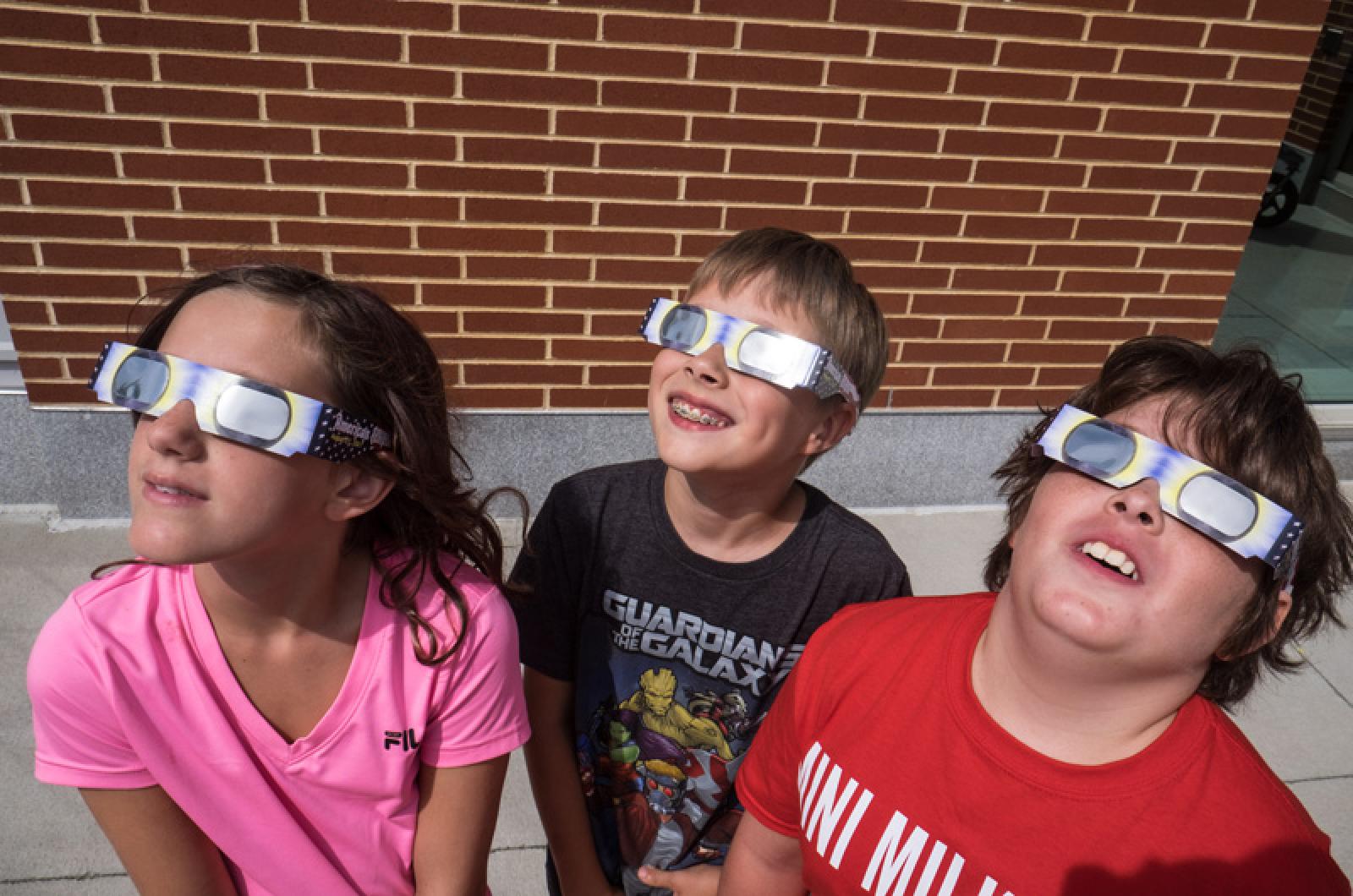During a total solar eclipse the darkening sky is not the only effect. The temperature drops, winds rise, birds stop singing, fireflies emerge and spiders start dismantling their webs.
On Monday, August 21, the first total solar eclipse to fully cross the United States in almost 100 years will cover a 70-mile wide strip of the country in darkness. While the Vineyard is at least a 15-hour drive from the path of totality, Islanders will still be able to witness a partial eclipse.
On the Vineyard, the moon will begin to block the sun around 1:30 p.m. The peak eclipse will occur at 2:48 p.m. and full daylight will resume around 4 p.m.
No matter where you are, to look at an eclipse, total or partial, protective glasses are essential. Watching with others is a good idea too. Social psychologists say viewing the event in a crowd is a big part of the magic. Some of the Island’s libraries are helping to make this happen by hosting events and providing protective glasses.
The Vineyard Haven Public Library is welcoming children to participate in youth-focused activities beginning at 12:30 p.m. on Monday. Adults are invited to arrive closer to the action at 1:15 p.m. Eclipse glasses will be available on the day of the event to be used on or around the library property. NASA’s live-stream will be projected inside the library and astro-themed refreshments will be served.
Vineyard Haven children’s librarian Libby Mueller said she has been pleasantly surprised with the interest in their eclipse event. “We have a culture that is so fast moving. If it wasn’t publicized, an eclipse could come and go and we wouldn’t know it passed,” she said.
The library program will provide a chance to pause and observe the cosmic physics lesson. The eclipse is a chance to think about where the celestial bodies are positioned in the solar system and how “sometimes we get in each other’s way,” Ms. Mueller said. It’s a chance to think about the planet and its future rotations, but also about the past and how scientific progress has shaped our understanding.
“Civilizations thought they were being punished for upsetting the gods,” Ms. Mueller said of past eclipses. Korean mythology describes fire dogs coming to steal the moon. In Hinduism, the god Vishnu is said to be slicing the head off the demon Rahu. A total eclipse in 7th century BC Greece prompted the poet Archilochus to write that “Nothing in the world can surprise me now,” stating that Zeus was responsible for the darkness.
“It’s a good chance to help ground young children in scientific fact,” Ms. Mueller said.
Vineyard Haven Library adult programming coordinator Betty Burton echoed Ms. Mueller’s thoughts, saying the lessons are valuable for all ages. “I want people to look at the science that’s in their lives,” she said. Ms. Burton first saw an eclipse about 40 years ago when she was studying at Purdue University in Indiana. Protective glasses weren’t widely available, she said, so everyone made mirror-and-cardboard contraptions that required the viewer to face their back to the sun.
“This will be much cooler, you can look right at it.” she said.
The Vineyard Haven Library will provide a large stack of fact sheets, but only 100 pairs of viewing glasses, so people should plan to arrive promptly.
Beth Kramer, director of the West Tisbury Library and the driving force behind its eclipse programming, won’t make it to their event on Monday. She will be firmly planted in a state park in Nebraska with her eyes on the sky. She will be in good company.
“I am traveling with Nelia Decker, West Tisbury Library’s children’s librarian and a total eclipse geek,” she said in an email.
Ms. Kramer vividly remembers her first time seeing an eclipse in second grade. “It changes your perception of the sun, the moon and the earth and of yourself.”
The West Tisbury Library held a pre-eclipse workshop with Charter School science teacher Jane Paquet. On Monday, Ms. Paquet will return to lead a question-and-answer session where live streaming will also take place, as well as outdoor viewing. Ms. Paquet will bring a device invented by her former professor called the Sunspotter, which allows viewers to see spots on the sun with their own eyes.
“For some people this is a watershed event,” Ms. Paquet said. “Maybe this will spark an interest in astronomy.”
“Even if it sparks them to write a poem, wherever it takes you is great,” she added.
This event starts at 1 p.m. and is open to all ages.
The Edgartown Library is also riding the eclipse wave. Assistant director and children’s librarian Debby MacInnis explained that their event, held from 1:30 to 4 p.m., would feature a science-fair style presentation of booths led by local junior high students. Professor R. Bruce Ward, from the Harvard-Smithsonian Center for Astrophysics, will be on hand to help with special eclipse-safe telescopes.
The library also installed a “bread box-sized” weather monitor outside for the event. Temperature and wind speed readings will come in every 15 minutes. Mrs. MacInnis explained that she doesn’t know what magnitude of weather variations to expect, but that “there’s only one way to find out.”
But Mrs. MacInnis will also miss her event on the Vineyard. “I’m going to Kansas because of a kid’s book,” she said, referring to Every Soul a Star by Wendy Mass, the novel that inspired her to make the trip.
“I will be 75 and my husband is 75. I have never taken time off in 40 years in the summer since my mother’s funeral,” Ms. MacInnis said. “The wind starts blowing, birds stop singing, crickets start singing. I gotta go.”







Comments
Comment policy »